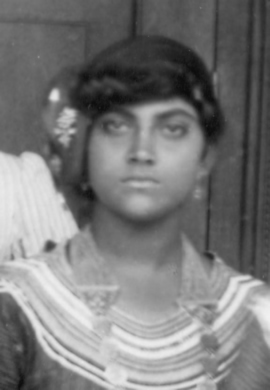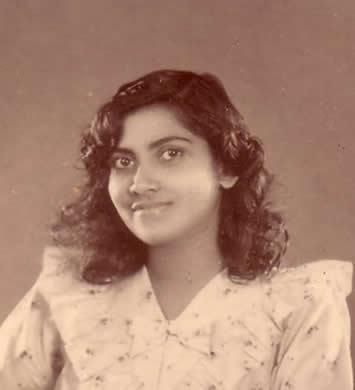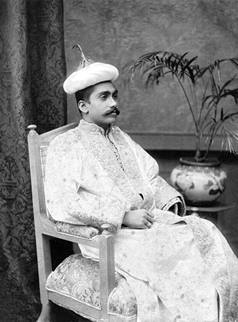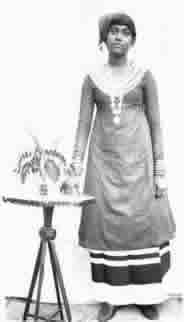|
11 March 2008
Oldest member of the
Royal House of Huraagey and Hilaaly dies
The
Family wishes to thank the incredibly large number of people who
have sent their condolences since this article was published. This
sharply contrasts with the pointed snub given by the government
of president of the republic Mr Gayoom
to the funeral of the Princess. In addition to Maldivians of all
walks of life who sent us messages of sympathy, we have received
a considerable number of messages from royalty watchers across the
world and members of foreign royal dynasties.
(this note is inserted on 15 March. To date,
we have received an average of about 2000 unique hits per day in
this page)
The Princess Maandhoogey Tuttudon Goma died at her residence, Vaidheriyaage,
in Malé today, 11 March 2008 at about 9:30 am local
time. She was aged 93.
The Princess Tuttudon Goma was the youngest child of the Prince
Maandhoogey Tuttu Manippulu who was Prince Regent, and therefore
acting head of state, to his brother the Sultan Mohamed Imaduddine
VI Iskander during the latter’s long periods of absence from
the Maldives. The Princess Tuttudon Goma did not have children but
married the Prince Hassan Farid Didi, who was the de facto
head of government during the reigns of the Sultans Mohamed Shamsuddine
III Iskander and Hassan Nooreddine II Iskander. Hassan Farid Didi
was presumed dead when His Britannic Majesty’s warship HMS
Maaløy he was travelling in between Addu Atoll and Colombo
was sunk on 27 March 1944 by the German submarine U-510.
The Princess Maadhoogey Tuttudon Goma was personally involved in
the early years of formal education of Maldive women and girls.
The Princess was an active participant in the Maldive women's emancipation
movement. She was the principal of the state-run Hameediya School’s
girls’ division since the division was incepted in the mid-1940s
until it was abolished in 1958.
The Princess had a reputation for practising fine Maldive handicraft
and training young women in those skills. In 1972 she was commissioned
by the government of the time to prepare the garland presented at
the State welcome to the Maldives of Her Majesty Queen Elizabeth
II.
The Princess was a patron of and active participant in sports, notably
table tennis and lawn tennis. She coached many Maldive women and
girls in table tennis and the first national table tennis tournament
was held at her residence. The home of lawn tennis in the Maldives
was, for many years across the street from her residence.
The Princess Tuttudon Goma was a Senator in the bicameral Parliament
of the Maldives during the short-lived first republic of 1953-54.
The Princess was the last surviving member of the Maldive Senate.
She was also one of the last surviving members of the Royal House
of Huraagey and Hilaaly who held Royal Privileges as defined in
the Royal Privileges Act that lapsed with the monarchy in 1968.
Some scheduled members of the Royal House, including the Princess
Tuttudon Goma, continued to be accorded these token privileges in
the republican era under Act Number 1/68-Javiyani of 11
November 1968 of the republican parliament. These provisions of
the Act were never formally repealed by legislation but simply disappeared
from statute books over the past 29 years.
The Princess’ death was ignored by the current republican
authorities. Her family did not receive the customary condolences
that the authorities send out following the death of a former state
dignitary and spouse of a former head of government.
  |
  The Princess Tuttudon Goma and her
father (above)
The Princess Tuttudon Goma and her
father (above)
|
 The Princess Tuttudon Goma (left)
and her elder sister the Princess Titti Goma. They are dressed
in the everyday wear of Maldive princesses that was in vogue
during the first four decades of the 20th century
The Princess Tuttudon Goma (left)
and her elder sister the Princess Titti Goma. They are dressed
in the everyday wear of Maldive princesses that was in vogue
during the first four decades of the 20th century
Evidently when the Titti Goma died in 1983, someone told the
Maldives president of the republic Mr Gayoom that "Titti
Goma has died" to which he replied "Titti Goma is
not a name". Under regulations currently imposed in the
Maldives by Arab and Pakistan trained mullahs, it is illegal
for Maldivians to have indigenous names. All names have to
be whetted by a committee of mullahs based in the main mosque
and traditional Divehi names are swiftly ruled out. Proxy-colonialism
is still alive and well in the Maldives and is enforced by
unpatriotic collaborators. Today, a list of Maldivians would
read like the telephone directories of Medina or Faisalabad;
a group photograph of Maldive women would look like a Saudi
harem. |
|




 rss feed
rss feed 





